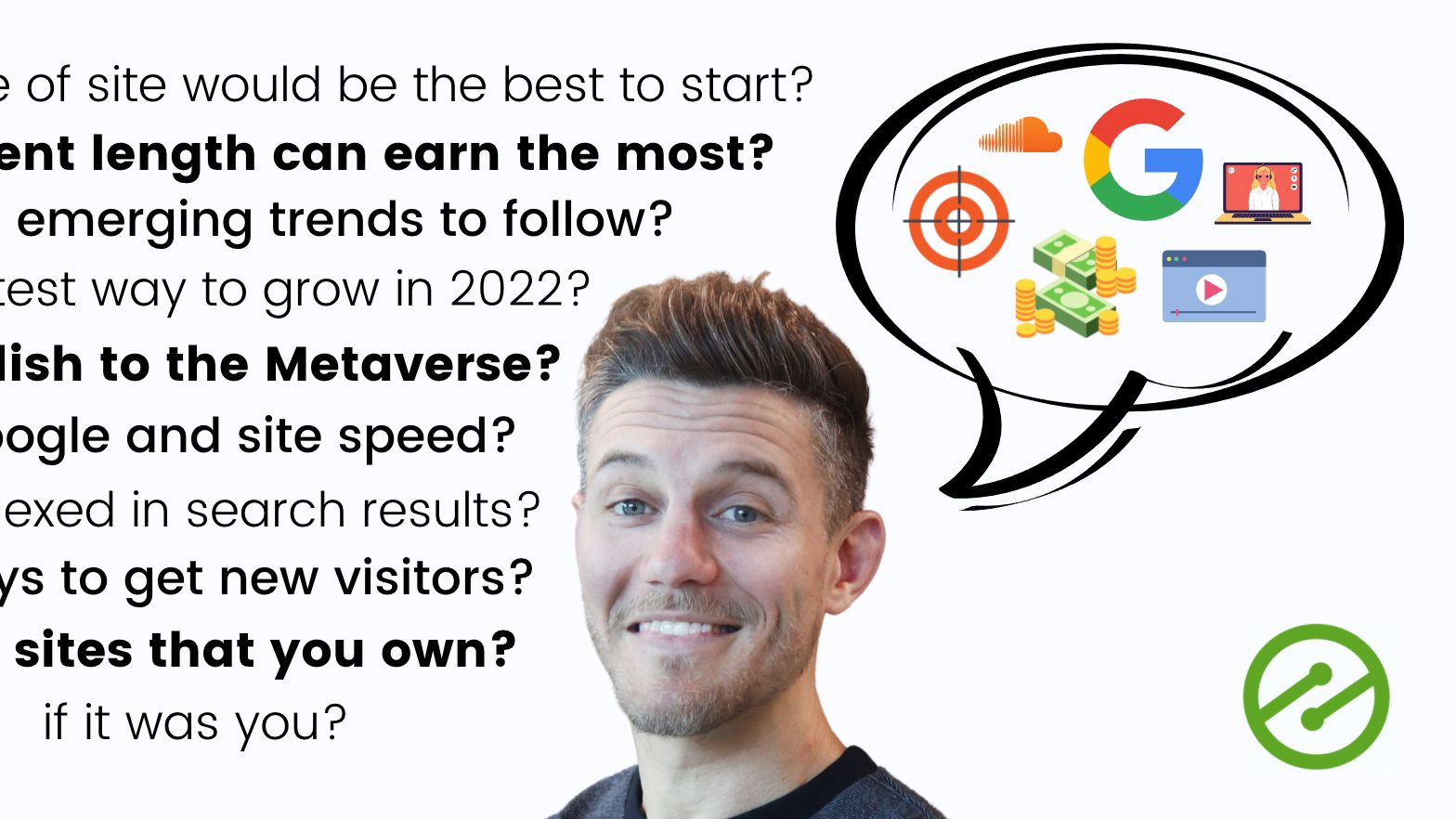Starting a new website can be both exciting and intimidating. Sometimes it can be hard to know where to start — do I buy a website that already has traffic, do I start a new website, what niche do I want to write about, what tools do I need to get started? Even if you’re not starting a new site, it can be difficult to know how to best grow your website to get substantial traffic and earnings.
Recently, we sourced some common questions on starting a new website directly from Ezoic customers. Ezoic CMO, Tyler Bishop, provided some answers and shared his advice on starting a new website and improving a current one.
Tyler is an award-winning digital marketer, founder of the digital publisher event Pubtelligence, CMO of Ezoic, and has a decade of experience to supplement the data from 50,000+ sites he’s had the chance to analyze for this topic.
If you’re looking for additional resources when it comes to starting or growing your website, we also have a four-part series in the works from guest blogger and successful digital publisher Ron Stefanski. You can read part one on knowing your market, part two on finding the right tech stack, and part three on important tips before launching your website.
Want to watch and listen to Tyler answer your questions? Check out our video below where you will also hear him answer two bonus questions: what should I be looking for when buying a new site and how do I keep a new or existing site lightweight?
If you were to start a new site, what would it be?
Tyler: Given my experience and how much data I get to see from tens of thousands of sites over years and years of development, here’s how I’d approach starting a new site myself.
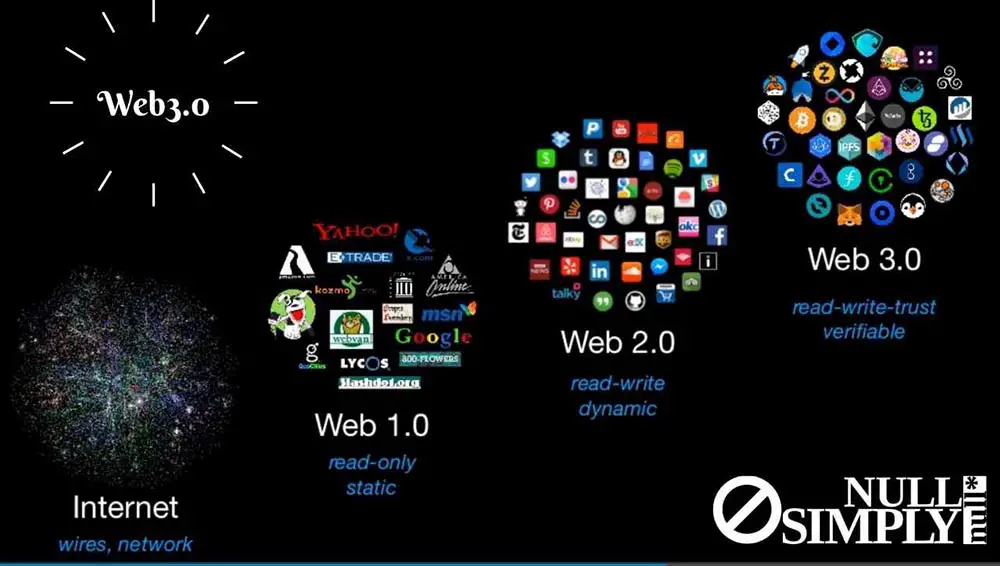
- Pick an emerging but popular topic. Often, the category or niche picking process is given too much attention early on. In many cases, existing content categories are saturated. This is especially true for evergreen types of content (i.e. U.S. Civil War history). You could easily circumvent a lot of competition and attract the attention of Google Search — and possibly some other unique channels of traffic — much faster if the site topic/niche was based on an emerging topic where expertise, authority, and queries/answers may not be well established yet. Here are some examples:
- Tesla. (highly talked-about company with new information and developing types of queries emerging every day) — while you may compete with large automotive sites, the sliver of automotive content on Tesla is not something that anyone will have established in a way that couldn’t be disrupted by someone hyper-focusing on providing great content around this subject as it develops.
- Web 3.0. This topic has just started gaining steam and comes from the crypto/blockchain world. While crypto and blockchain have seen massive increases in sites covering these topics, Web 3.0 is an emerging area where everything from news-tutorials is grossly underrepresented in search results.
- HRV (Heart Rate Variability) and Respiration Rate. These are both newly minted terms in the health space that represent common metrics used by wearable fitness devices. There are many of these that have been added in the last few years as the popularity of wearable fitness devices have gained popularity. What’s more, these subjects have quite a bit of depth in terms of how to use the data, what it means, benchmarks, reviews/analysis of tracking tools/products, etc.
- Avoid competition by expanding into video. In addition to the tip above, what adds another layer of differentiation (circumventing competition) is being able to be on the forefront of video for your topic or category. Written content has a lower barrier for development and is a greater commodity than video.
Use data as early as possible to maximize profits. One of the greatest opportunities missed by many sites I see each day is in evaluating the value of existing content. Sites will learn years after growing their site that a specific type or subject category of content is earning double the rest of their content (EPMV). This means that throughout their growth cycle, they could have earned 2x the revenue had they applied more data-driven content creation processes to their efforts. I have a really good interactive blog on this exact topic.
What are the next big website trends and how can I prepare?
Tyler: Realistically, if we look at the trends in digital publishing, there continues to be more websites and content across the web, but the demand for content and digital advertising keeps going up as well. So competition isn’t something to view as an emerging risk.
That said, we can look at trends in overall content and say that the world seems to be moving towards a lot more video. And while there is a lot more video being created on platforms like YouTube or TikTok or streaming platforms like Netflix, Hulu, and Disney+, we have yet to see the kind of explosion in video content as it relates to the same way you see a lot of niche or category-based websites.
There’s a large delta between written content available versus video content. To me, that’s a big opportunity if you have a site or are building a site on a topic that lacks the same depth of content in video form.
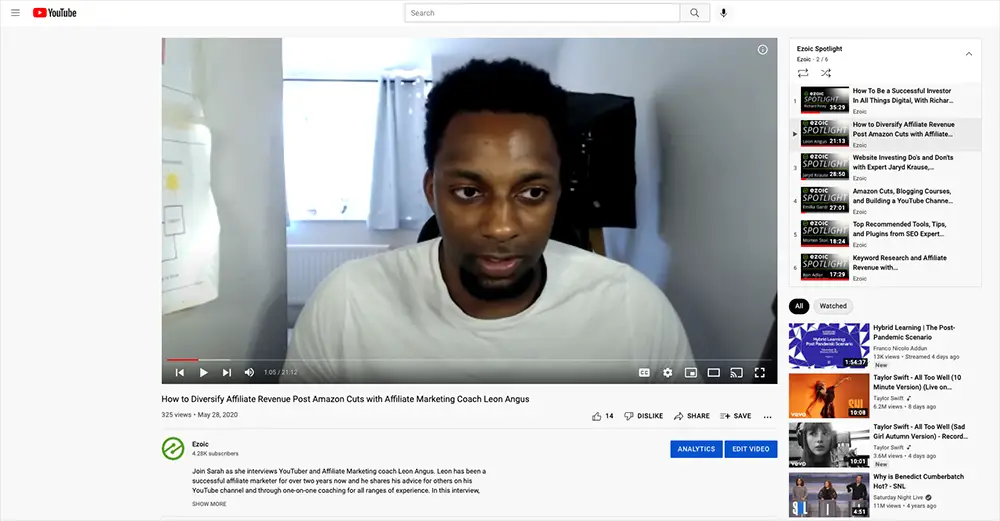
There’s a wealth of great content written on independent sites but that same wealth of quality and variety isn’t matched in quantity by digital video.
The barrier to entry for video and creation is much higher, which makes it difficult. But at the same time, the software for video has improved quite a lot and you can create really quality video or graphics that used to be really difficult to make.
If I think even further out, one of the trends that publishers should embrace is independence. There are a lot of new platforms, networks, and frameworks that people are building audiences on and creating content for. However, if we look at something like Facebook and the content people created on there five or six years ago, publishers found themselves trapped in a walled garden; they saw less and less traffic to their pages, couldn’t monetize their content the way that they wanted to, and were subject to rules and regulations that were constantly changing.
Publishers should be thinking about how to build an audience but ultimately how they can own that audience on those types of platforms and maintain a sense of independence. I think there are a lot of emerging opportunities for owning your audience that will occur for publishers in the next three to four years.
What’s the minimum number of published long-form posts on a new website in order to grow organic rankings?
Tyler: There is no minimum number; I would say throw that out the window as something that is even a consideration.
I think the question itself implies that longer articles are necessary or something that all publishers should create, and realistically, that’s not the case. Something that drives me crazy is when I visit a site, for example, for a how-to, and I get an entire history and anthology on the subject as well; none of that answers my question.
If your goal is to grow organic search, especially on a new website, write good, unique content. I think one of the biggest mistakes people make is they start a website, pull together information, data, and writing based on keyword research, and don’t even pay attention to the fact that their content isn’t unique. That content already exists out there.
I think long-form posts are just a medium, and you have to consider if that form is the best way to deliver that information to your audience. If you look at search results, we’re seeing increasingly more sites ranking really well with short-form, rich content with a lot of images and videos. However, that may not be the case for your topics; if you search and see that long-form content ranks better for queries you’re trying to rank for, then you should consider writing longer content.
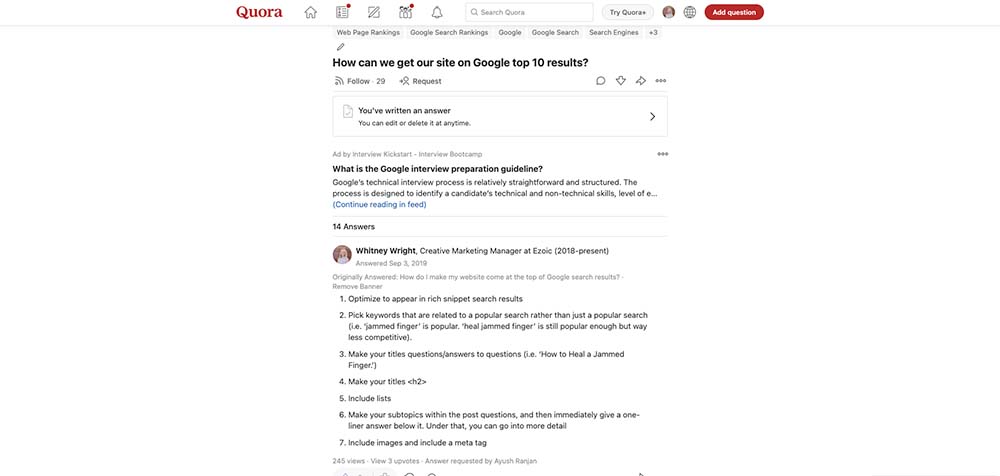
The most important thing for a new site to start ranking inside search results is to actually get traffic to your site (in an ethical way). Do everything in your power to market your site–go on Quora and answer questions, find communities or forums, go into comment sections. Figure out if there is somebody who has a newsletter that would be willing to share your article out there.
I had a website on injuries once and I would go around and find popular reporters that would report on athlete recovery time for injuries and post my articles as a reply tweet in the feed of someone popular when they would tweet about athlete injuries. That’s a great way to start showing up in search results.
When is the correct time to add a new website to your portfolio?
Tyler: This really depends on your bandwidth and ability to scale. I’m actually not the best person to ask because I own hundreds of sites in early development and it’s because I spend all my time working on Ezoic, so I haven’t proven myself efficient at this personally 🙂
However, what I have seen other publishers find a lot of success with is having a primary site that they’ve built to an established level and then they’ll usually start one or two additional sites once they have scaled that original site. This can mean hiring writers or having a streamlined process to adding content to that site and then they start building adjacent sites in different categories or niches. I would say to start with an original site that you develop and then you can use it as leverage for your newer sites and use its resources.
When is the right time to start a new site?
Tyler: One of the things that I have found personally is that when you have too many sites that are similar to one another, you have to make a decision about where you want to put that content—do you put it on your more developed site where it will get more traffic, or use it to build your newer site? I find it’s generally better if a publisher picks a new topic that is a little different or the type of content medium is going to be different. I like picking out new topics through tools like Google Trends or trending on Twitter, though I am a big advocate for writing on something you’re passionate or knowledgeable about.
What are the items that you think are needed to start a new site (Google Analytics, plugins, etc.)?
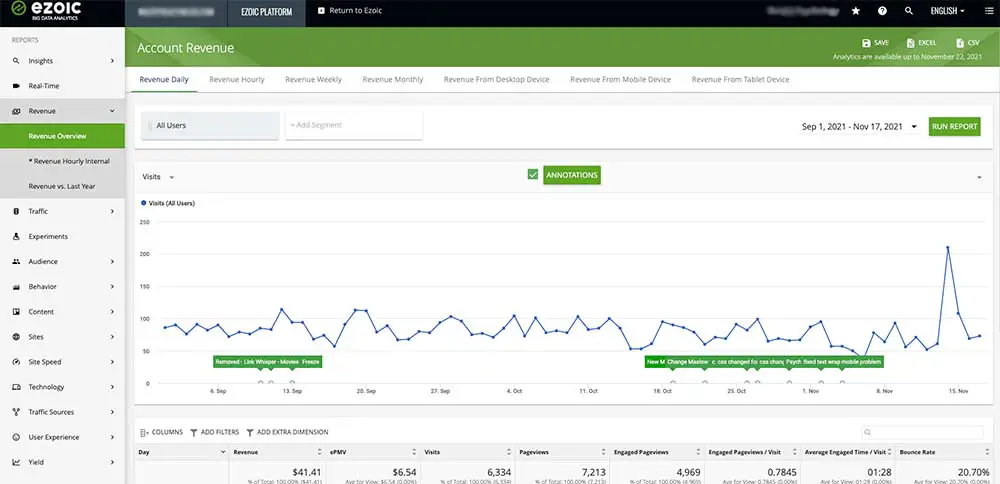
As far as minimum required tools to start a new site, I always work lean; some type of analytics. like Ezoic’s Big Data Analytics. is great, and then I actually have less than five plugins on my WordPress sites.
If you don’t want to code your own forms, WPForms is a good option, but realistically less plugins is more. It’s more important to get the content out there and that means spending less time on the other stuff. That’s one of the reasons why Ezoic has recently added so many tools and features—to make that process easier.
I’ve been working on my website for more than a year but I don’t see results. What should I work on?
Tyler: You should work on marketing that content and making sure the content is good. You don’t want to have to rely 100% on search engines for your traffic; you can become incredibly dependent in those instances. Sites that have been successful over time have found a way to get traffic from other resources as well, like a newsletter, social media, or forums and communities.
You can kind of think of it as your content is your product, so if you’re a publisher, the content that you’re making should be something you can ‘sell’; your audience gets it for free, but they ‘pay’ for it with their attention and advertisers obviously want that attention, so they’ll buy your ad space for it.
If you have lots of posts, you should be able to find places where you can actually get people to want to read that content. Getting traffic to those posts is really important because one of the things Google is always going to be trying to figure out is essentially ‘is this content good and is it trustworthy?’ One of the things Google is going to need to determine those two things is enough data. It will use that data to see if that content is as good or better than other content and if it’s trustworthy.
Is it better to focus on one website with various topics/categories, or to create websites per category?
Tyler: It really depends on your topic or category. In general, I haven’t seen a ton of sites have great success with a complete grab-bag of concepts and categories; there usually needs to be some sort of underlying theme. You can do very broad categories, and I’ve seen some publishers have success with that, but then I’ve also seen sites that really niche down to where they are focusing on a specific brand of product.
If you have a website with a broad range of topics, you’re likely to run into more competition than if you pick a more niche category. Sites that do well with a wide range of topics usually already have an established audience, like an influencer.
I’m not as big of a fan of finding the right category, niche, or keywords; there are a lot of people that will tell you that is important, but for me, I continually find that the most successful publishers are good at writing unique content and usually either passionate about a subject, an expert in a subject, or do the hard work to create different content than what exists today. This could be a different form, like video; that’s an opportunity to create a category.
When’s a good time to give a category its own presence?
Tyler: You can pick a popular category that is already crowded but if people aren’t speaking or writing about that content, in the same way, that’s an opportunity.
In my injury website example, my content was beating out websites like WebMD even though I’m not a doctor or physical therapist because I was writing it from a different perspective; I was writing it from the perspective of if you’re an athlete and you’re injured, this is what to expect–what the medical books would say and what it would feel like. Providing that perspective was something that was really popular and over time, it started ranking well. So I would say it is really important to pick something that you can provide a unique perspective on more than anything.

